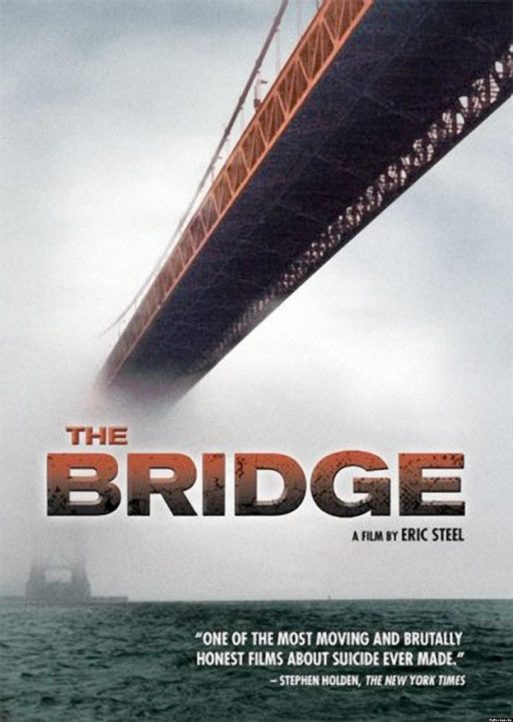 When we hear news of a recent suicide, whether near or remote to our own lives, everything in us stops still. We naturally think: “why suicide?” Understanding and examining suicidal tendencies is unquestionably one of the most mysterious, difficult topics to broach. In “The Bridge,” a documentary by director Eric Steel, the conditions surrounding suicide are probed through Golden Gate Bridge suicides that took place in 2004.
When we hear news of a recent suicide, whether near or remote to our own lives, everything in us stops still. We naturally think: “why suicide?” Understanding and examining suicidal tendencies is unquestionably one of the most mysterious, difficult topics to broach. In “The Bridge,” a documentary by director Eric Steel, the conditions surrounding suicide are probed through Golden Gate Bridge suicides that took place in 2004.
Watching this film is not for the faint of heart. If real footage of people jumping to their death is not for you, I’d recommend passing on this film. Is it a movie to heal by? I cannot begin to fairly judge since I have never personally suffered a suicide. What I can say is, this movie intensely explores the pain, reflections, and thoughts of family and friends who remain behind those who chose to end their lives. It investigates their lifelong journey of healing.
As I watch The Bridge in my San Francisco apartment just minutes from the actual Golden Gate Bridge, it’s appropriately a dreary, rainy day; the distant intermittent sound of a foghorn can be heard as it passes under. The powerful grip of the film slowly takes me under into a gloomy, depressing place. I think: who can possibly resist the sheer potency of this melancholy film to alter one’s own mental state? Once there, we understand that the director must take us to this place where suicide lives before we can begin to examine it. We find ourselves getting a true glimpse into the mental state of those who have jumped and the family and friends who remain to live with the pain. Watching is painful; yet we gain greater empathy towards those who jumped, and the survivors, as we hear their stories.
 This movie uses stunning images of the massive red painted steel struts to depict the Golden Gate Bridge, one of the most beautiful and romantic bridges in the world. It serves both as metaphor and vehicle for suicide. It sways in the wind, as emotions do, with the mystery of the fog rolling endlessly through the steel beams. Obscuring our perspective of reality, it spans between the solid footed rock that represents a healthy life. Reality is always on the horizon – so near and yet so far. Eric Steel uses blurred images of streaming tourists and cars juxtaposed against focused images of those who lean at the railing edge, contemplating a jump. As one parent notes, the “false romantic promise of the bridge is magnetic.” We struggle along with the film to understand and make sense of such a tragic, senseless act.
This movie uses stunning images of the massive red painted steel struts to depict the Golden Gate Bridge, one of the most beautiful and romantic bridges in the world. It serves both as metaphor and vehicle for suicide. It sways in the wind, as emotions do, with the mystery of the fog rolling endlessly through the steel beams. Obscuring our perspective of reality, it spans between the solid footed rock that represents a healthy life. Reality is always on the horizon – so near and yet so far. Eric Steel uses blurred images of streaming tourists and cars juxtaposed against focused images of those who lean at the railing edge, contemplating a jump. As one parent notes, the “false romantic promise of the bridge is magnetic.” We struggle along with the film to understand and make sense of such a tragic, senseless act.
The film is a series of interviews with family and friends who tell stories of those they lost to suicide and the circumstances that played out beforehand. The viewer is tossed into a range of emotions like the sea below. One cannot help but seek patterns and answers. Was it their need for finding love? Were they out of step with society due to a condition or a form of depression? We listen to how meds take them down instead of up, often resulting in being confined to clinics or homes, and in some cases homeless. “Nothing would change his mind. I think the medicines make him worse,” a mother notes. Some cry hopelessly as they travel to the bridge to jump. As they stand by the bridge’s rail overlooking their impending death, we watch people walk by completely unaware. We witness a few who reach out to grab them as they climb over the rail. “The only way to stop the pain, is by more pain,” a parent describes, referring to the jump off the bridge. Another states: “He thought his body was a prison and [jumping] was the only way he could get free.”
 In its short duration, this film does not judge its subject, it simply allows us to grapple with the reality of suicide. By the end, we accept that there is no set pattern. We see each interviewee express their own personal way of coping with suicide, and accept it at face value. As one parent says, ”I just know she’s at peace.” The Bridge is a vehicle to display the great range of emotions of those who will spend the rest of their lives living with a suicidal loss. Kevin, the only survivor of a jump, describes his desire to die as “an alien” or out-of-body experience. In a way, this film is also an out-of-body experience. As we learn what it must feel like, however temporary, for the survivors who will continue to exist in that dark place for a very long time. My heart goes out to all of them.
In its short duration, this film does not judge its subject, it simply allows us to grapple with the reality of suicide. By the end, we accept that there is no set pattern. We see each interviewee express their own personal way of coping with suicide, and accept it at face value. As one parent says, ”I just know she’s at peace.” The Bridge is a vehicle to display the great range of emotions of those who will spend the rest of their lives living with a suicidal loss. Kevin, the only survivor of a jump, describes his desire to die as “an alien” or out-of-body experience. In a way, this film is also an out-of-body experience. As we learn what it must feel like, however temporary, for the survivors who will continue to exist in that dark place for a very long time. My heart goes out to all of them.

 “The Bridge” Analyzes Why Suicide Happens by Eric Steel
“The Bridge” Analyzes Why Suicide Happens by Eric Steel


 Funeral Favors Offer Visitors a Tangible Memento
Funeral Favors Offer Visitors a Tangible Memento
 “Comeback” by Prince
“Comeback” by Prince
 “Other Side” Documents Woman’s Fight To Die As She Wishes
“Other Side” Documents Woman’s Fight To Die As She Wishes














